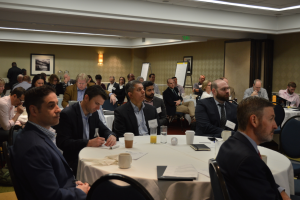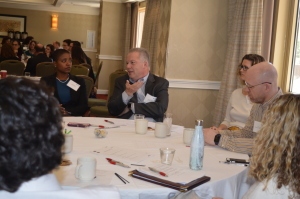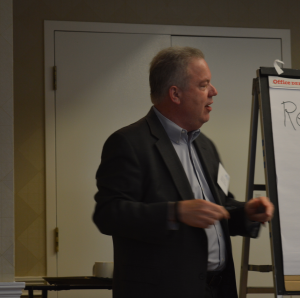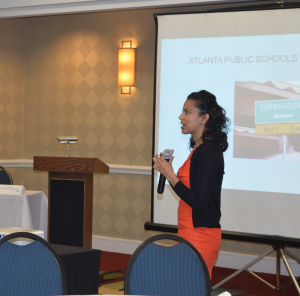 The Georgia Charter Schools Association played co-host this week to the leaders of Charter Support Organizations (CSOs) and public charter school attorneys from across the nation. The events were part of a Master Class on Accountability organized by the National Alliance for Public Charter Schools (NAPCS) and a three day Legal Seminar put together by NAPCS and the National Alliance of Public Charter School Attorneys. Both events were held at the Marriott Suites in Midtown Atlanta.
The Georgia Charter Schools Association played co-host this week to the leaders of Charter Support Organizations (CSOs) and public charter school attorneys from across the nation. The events were part of a Master Class on Accountability organized by the National Alliance for Public Charter Schools (NAPCS) and a three day Legal Seminar put together by NAPCS and the National Alliance of Public Charter School Attorneys. Both events were held at the Marriott Suites in Midtown Atlanta.
 GCSA President and CEO Tony Roberts was selected to co-lead one of the seminars during the Master Class on Accountability on Tuesday, April 17 (Roberts is pictured on the left in the center of the table and below on the right). One of the main focuses of the session was on school quality. Roberts told attendees that Georgia Charter Schools Association has learned that one of the best ways to achieve a quality school is to ensure that a school is strong from its beginning stages. He spoke about GCSA’s efforts to develop new schools and replicate schools that are already academically and operationally successful. Roberts said GCSA is just beginning this work, which is led by GCSA Vice President of New School Development Aarti Sharma.
GCSA President and CEO Tony Roberts was selected to co-lead one of the seminars during the Master Class on Accountability on Tuesday, April 17 (Roberts is pictured on the left in the center of the table and below on the right). One of the main focuses of the session was on school quality. Roberts told attendees that Georgia Charter Schools Association has learned that one of the best ways to achieve a quality school is to ensure that a school is strong from its beginning stages. He spoke about GCSA’s efforts to develop new schools and replicate schools that are already academically and operationally successful. Roberts said GCSA is just beginning this work, which is led by GCSA Vice President of New School Development Aarti Sharma.
As GCSA has started these efforts, Roberts has noticed that board makeup tends to present challenges as high-quality schools decide whether to move forward with replication. He said boards that have a higher number of parents tend to be reluctant because they worry about how the flagship school and their children would be affected by efforts to form a second school. He said other boards with fewer parents have initially expressed more interest. Roberts said he and Sharma have stressed the importance of this work.
challenges as high-quality schools decide whether to move forward with replication. He said boards that have a higher number of parents tend to be reluctant because they worry about how the flagship school and their children would be affected by efforts to form a second school. He said other boards with fewer parents have initially expressed more interest. Roberts said he and Sharma have stressed the importance of this work.
“If schools do this right they are not only making the opportunity available for other students, but they will become stronger in a lot of areas.” said Roberts.
Roberts told participants that one of the struggles in Georgia is how to grow an independent charter school from one location to two. It’s something GCSA is working to address. He said at least one of the funders the association spoke with typically only works with schools after they have opened two locations and are working toward a third school. He also said attracting Education Management Organizations with a proven track record to assist with replication is difficult in Georgia because authorizers typically do not approve enough schools at one time and funding levels are not high enough. Roberts said national research shows that EMOs typically require at least $10,000 per student to make their educational models work.
Despite the initial challenges, Roberts said funders are starting to show interest in this critical work. He said schools interested in replicating could potentially receive federal Charter Schools Program (CSP) funding, state dollars and money from private funders.
“We are greatly encouraged by the support we are starting to see for replication efforts,” said Roberts.
 In addition to the discussion led by Roberts, GCSA Vice President Aarti Sharma was featured in a panel discussion on Thursday, April 19, during the Legal Seminar conducted by the Alliance for Public Charter School Attorneys. The discussion focused on the evolution of charter schools in Georgia. It also examined Georgia’s legal and political landscape, efforts to grow and replicate the charter school sector. The challenges and opportunities created by Atlanta Public Schools’ recent embrace of charter school operators to turn around traditional schools was another topic of discussion among panelists.
In addition to the discussion led by Roberts, GCSA Vice President Aarti Sharma was featured in a panel discussion on Thursday, April 19, during the Legal Seminar conducted by the Alliance for Public Charter School Attorneys. The discussion focused on the evolution of charter schools in Georgia. It also examined Georgia’s legal and political landscape, efforts to grow and replicate the charter school sector. The challenges and opportunities created by Atlanta Public Schools’ recent embrace of charter school operators to turn around traditional schools was another topic of discussion among panelists.
Those participating in the Legal Seminar also heard from Daniel Shoy, Jr.
President and CEO of the East Lake Foundation. Shoy told attendees about the East Lake Foundation’s work with Charles R. Drew Charter School and its efforts to create permanent pathways out of poverty.
In addition to leading several discussions, GCSA hosted a welcome reception for Legal Seminar attendees.